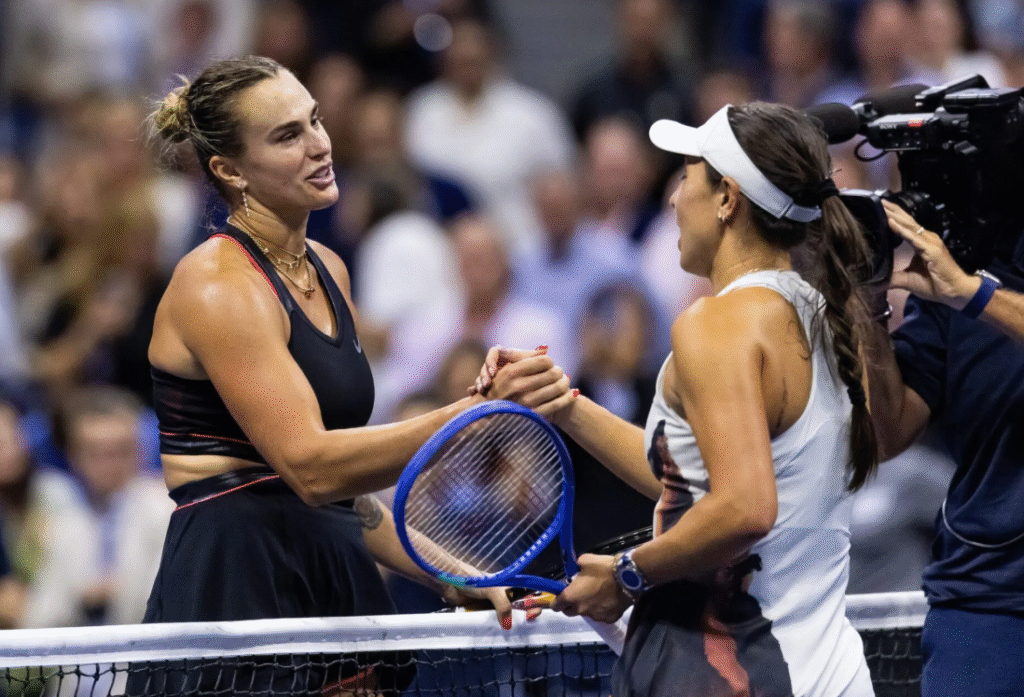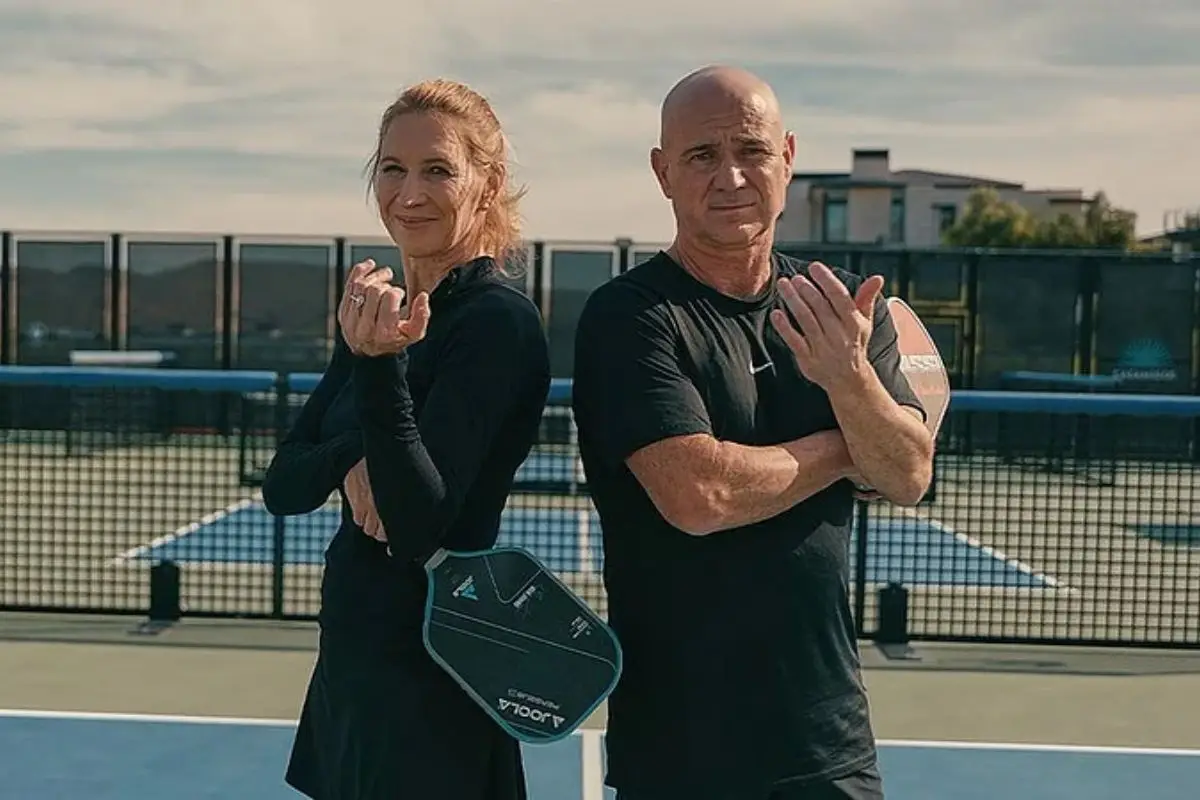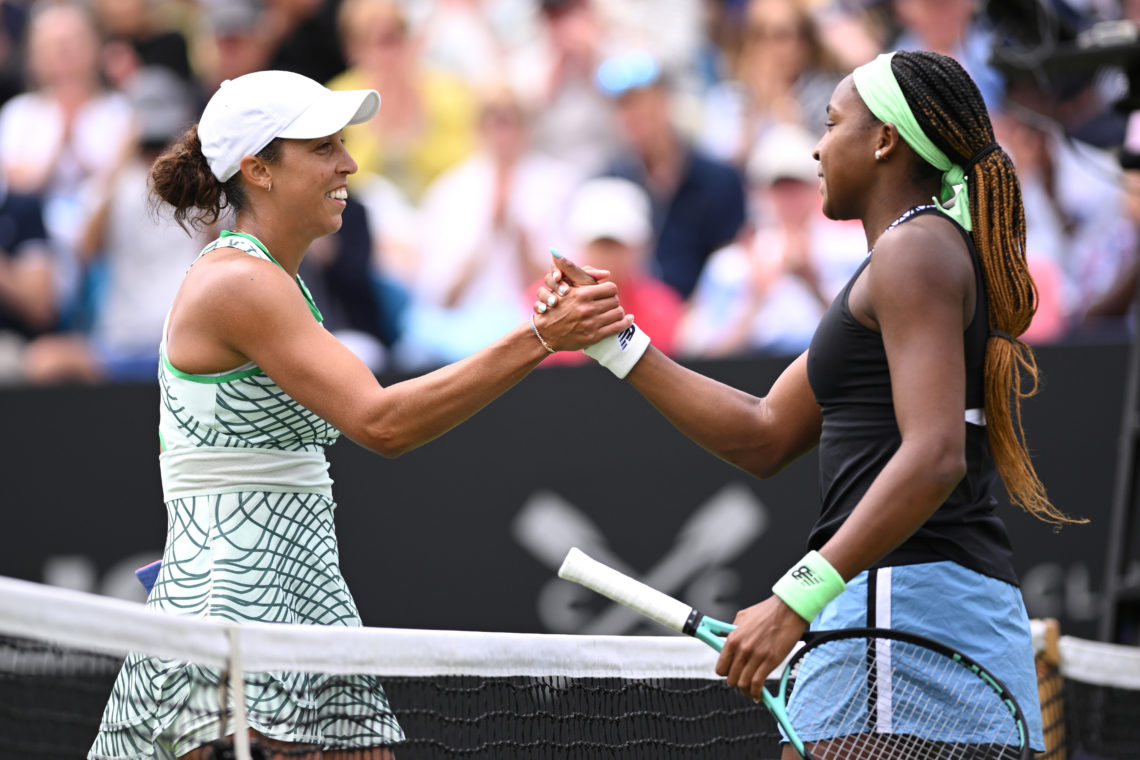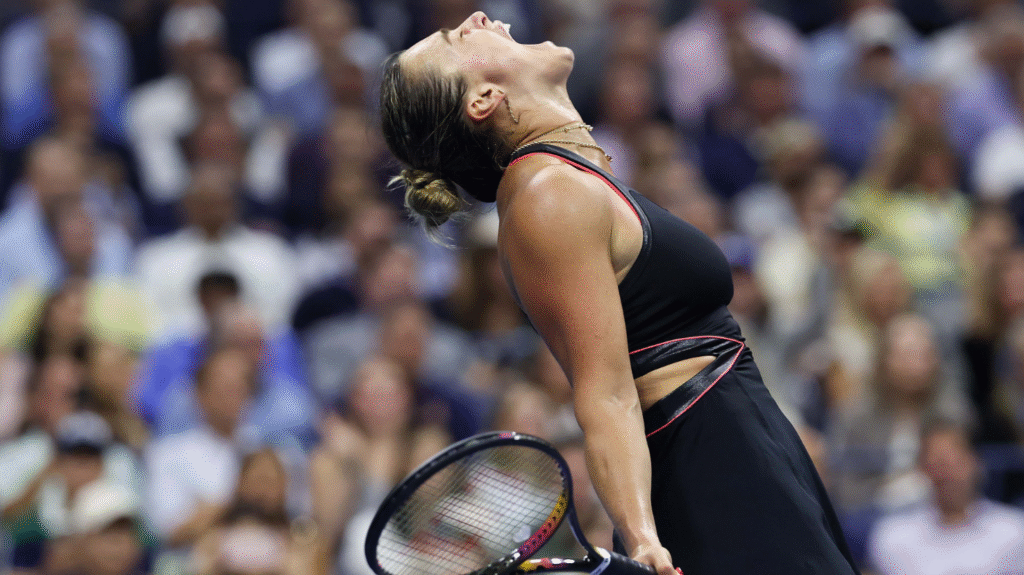
A Battle Replayed: 4–6, 6–3, 6–4. Aryna Sabalenka defeated Jessica Pegula in three sets to reach her third consecutive US Open final. The defending champion now eyes back-to-back titles at Flushing Meadows.
For the third straight year, the bright lights of Arthur Ashe Stadium will welcome Aryna Sabalenka into the US Open women’s singles final. On a dramatic night in New York, the Belarusian world No. 1 powered past American favorite Jessica Pegula in three gripping sets, 4–6, 6–3, 6–4, to secure her place in the championship match.
The victory was far from routine, and that is precisely what made it so memorable. This semifinal was more than just a clash between two top players—it was a test of resilience, mental fortitude, and the ability to rise when the moment called. Sabalenka, once criticized for her inconsistency on the biggest stages, showed once again why she has evolved into one of the most dominant forces in modern women’s tennis.
A Rocky Start Against a Determined Pegula
In front of a buzzing New York crowd that was firmly behind its American contender, Jessica Pegula came out firing. She dictated the tempo of the first set with flat, penetrating groundstrokes and a relentless ability to redirect Sabalenka’s power. The world No. 1, meanwhile, looked unsettled, her booming serve betraying her with a couple of untimely double faults.
Pegula broke midway through the opening set and, urged on by chants of “Let’s go Jess!”, calmly closed it out 6–4. For a moment, the Arthur Ashe audience dared to believe that this could be the year their home hope finally reached a Grand Slam final.
But Sabalenka has grown used to the hostile atmosphere in New York. Instead of folding, she dug deeper.
The Turning Point: Sabalenka’s Aggression
If the first set belonged to Pegula’s precision, the second set belonged to Sabalenka’s raw firepower. She amped up her intensity on return, stepping inside the baseline to punish Pegula’s second serves. The breakthrough came in the fourth game, where Sabalenka earned her first break of the night.
From there, her confidence snowballed. The aces began to flow, the forehand started to land heavier, and most importantly, the mental errors that haunted her in earlier years all but disappeared. She closed the set 6–3, letting out a guttural roar as if to remind everyone that she was still very much the reigning champion.
“I just kept telling myself to focus on the next point, not the past,” Sabalenka revealed in her post-match press conference. “I knew if I stayed aggressive, I would have my chance.”
The Final Set: Composure Under Fire
With the match tied at one set apiece, the pressure was immense. Pegula, backed by the raucous New York crowd, refused to go away quietly. She forced Sabalenka into long rallies, tested her footwork, and carved out opportunities on return.
But Sabalenka showed her maturity. She broke early in the deciding set and held her nerve when Pegula pressed hard to break back. Twice she faced break points in the eighth game, and twice she erased them with unreturnable serves.
At 5–4, serving for the match, the world No. 1 didn’t flinch. After a tense exchange, Sabalenka blasted a forehand winner down the line on her third match point, sealing the victory with trademark power and a triumphant fist pump.
Final score: 4–6, 6–3, 6–4.
By the Numbers: Sabalenka’s Winning Formula
Sabalenka’s victory was not just about heart; the stats underline how she turned the match around:
- Winners: 43, compared to Pegula’s 27.
- Aces: 8, coming at crucial junctures.
- First-serve points won: 74%, a reflection of her ability to protect her biggest weapon under pressure.
- Mental resilience: Saving 5 of 7 break points in the final two sets.
It was a textbook example of how Sabalenka balances controlled aggression with improved composure. A few years ago, this might have slipped away from her. Today, she knows how to lock in when the match hangs in the balance.
Historic Run at the US Open
This triumph puts Sabalenka in rare company. She becomes only the second woman in the past decade to reach three consecutive US Open finals, following in the footsteps of Serena Williams. Even more impressively, she now has a chance to defend her title—something no player has achieved since Serena’s back-to-back-to-back triumphs from 2012 to 2014.
Beyond the numbers, the symbolism of Sabalenka’s run cannot be overstated. Once regarded as a talented but temperamental player, she has matured into the standard-bearer of women’s tennis. Her ability to dominate majors consistently—winning in Melbourne, contending at Wimbledon, and now excelling again in New York—cements her status as the sport’s alpha competitor.
Pegula’s Brave Effort
While the night ended in disappointment for Jessica Pegula, she deserves credit for pushing Sabalenka to the edge. The American has often been criticized for falling short in the latter stages of Grand Slams, but this performance showed she is edging closer to breaking through.
Her tactical discipline in the first set and her grit in the deciding set proved she belongs among the elite. The crowd recognized her fight, giving her a standing ovation as she left the court.
For Pegula, the quest for a first Grand Slam final continues, but her resilience suggests it may be only a matter of time.
A Blockbuster Final Awaits
Standing between Sabalenka and her second US Open crown is Amanda Anisimova, the 23-year-old American who staged a remarkable comeback to topple Naomi Osaka in the other semifinal. Anisimova and Sabalenka have recent history: it was Anisimova who upset the world No. 1 at Wimbledon earlier this summer.
That loss will still be fresh in Sabalenka’s mind, making this final not just a chance at glory but also redemption. With Anisimova’s fearless shot-making and Sabalenka’s raw power, fans can expect an electrifying clash on championship Saturday.
Sabalenka’s Mindset
More than her physical gifts, Sabalenka’s transformation has come from her mental toughness. After her victory, she admitted:
“There were moments when I felt I was losing control, but I told myself to just fight for every ball. That’s the only way to win here.”
It’s a philosophy that has carried her from near-breakdowns in her early career to now being the player to beat on the grandest stage.
What’s at Stake
If Sabalenka wins the final, she will:
- Successfully defend her US Open title.
- Capture her fifth Grand Slam trophy overall.
- Cement her place as the undisputed world No. 1 heading into 2026.
But beyond trophies and rankings, a win would also solidify her narrative as the dominant force of her era—the one who picked up the torch from Serena and carried it forward with a style uniquely her own.
Final Thoughts
Aryna Sabalenka’s semifinal triumph over Jessica Pegula was more than a victory; it was a statement. It showed her resilience against adversity, her power against precision, and her composure against pressure.
Now, as she prepares to step onto Arthur Ashe Stadium once more, the stakes could not be higher. Win or lose, her run to a third consecutive final already places her among the greats. But for Sabalenka, greatness is not enough—history beckons.
